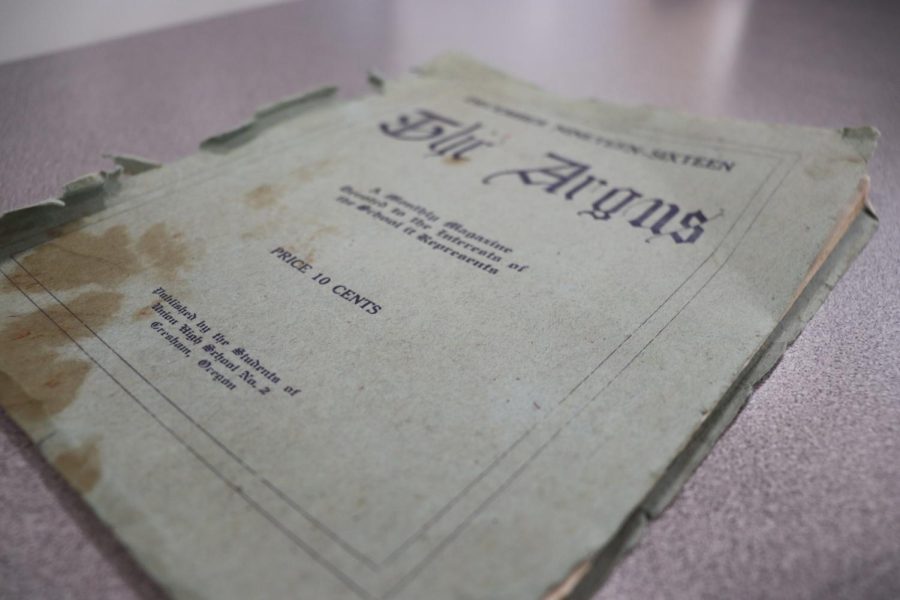The Argus Archives: What was GHS like back in the day?
April 16, 2022
Did you know that this newspaper is over 100 years old? The first edition of The Argus, written back in 1916, writes, “This magazine is the outgrowth of a desire on the part of the students of Union High School No. 2 to see in print once a month many items of interest pertaining to the school, and to encourage literary work.” A lot has changed since then, but maybe this century-old piece of writing has more connections to today than you would expect.
Two years before the newspaper was first published, our school was founded. At the time, it was referred to as Union High School, eventually it became known as Gresham Union High School, and finally just Gresham High School.
The structure of the first edition of The Argus was a lot different than the newspaper today. It was originally a magazine, not a newspaper. Instead of only students in the newspaper class writing and designing it, all students and classes were encouraged to contribute something to an issue, and there was a group of editors that would select and edit the accepted stories. For instance, the sports team would write a recap of recent football games, and students and teachers alike would submit articles or stories about their own lives and experiences.
In the first edition of the newspaper after the introduction there is an article titled, “A Well Remembered Night,” which is about a teacher and his friends going on a trip into the mountains after graduating from college. After taking a wrong turn, they were lost in the woods, but were lucky enough to find a cabin as it was getting dark. Inside was an elderly couple who fed them and offered to let them sleep in their loft. They agreed, and quickly fell asleep. However, in the morning, they heard the old man mumbling while walking upstairs, holding a butcher knife.
The author writes, “We pretended that we were asleep. He came very close to where we were lying, and we prepared to jump and run for [our] life. But watching him a little closer we noticed that he did not stop at our bed but went to a small meat box in the corner of the room and started to slice some of it for our breakfast, much to our relief and comfort.”
On the next page there is a section called “Did it Ever Occur to You”, which is a list of ‘fun facts’ related to the school. For instance, the school had just recently reached 175 students, the school’s motto was “everybody’s happy,” and it also includes a reminder for students to expect snow soon (the issue was published in December). Some stories in the paper wouldn’t look out of place today, such as the school year being one third over, a reminder to walk on the right side of the hall and keep moving, and that the football team had recently won.
Along with stories and informative sections, the first issue included a few poems; for instance, one written by a senior about how annoying freshmen can be:
Freshies, freshies everywhere is the wail of sophomores;
Freshies here, and freshies there, their number reaches scores;
All the classes confusion, none are in their rightful place;
Freshmen mixed with seniors, ‘tis the sad but truthful case.
The poem continues for a few stanzas longer, talking about how the dean (equivalent of a principal) is annoyed by the freshmen, and the chaos they cause, but ends with a more positive message:
And freshies come and freshies go, but none remain for long,
Though we confess that even we, -the seniors staid and strong-
Long, long ago, when Father Time was but a little child,
Were also dinky freshmen, so meek and green and mild.
An informational article titled “The Evolution of the Implements of War,” describes how weaponry has evolved over time, starting with simple clubs and knives used by cavemen, to Native American bows, to the invention of gunpowder and basic firearms, and their development throughout the civil war and ‘modern times’ (1916).
“At the present time we have the large forty-two centimeter gun, asphyxiating gas, aeroplanes, dirigibles [airships], submarines, and the modern carbines,” writes the author, Geo W. Clark.
These ‘advancements’ were all too real for those caught up in the fighting of the First World War, which had started two years prior (though America would not enter the war until 1917), and would lead to the death of 40 million people. The article ends with a final ominous sentence: “The implements of war have been improved, but have the minds of men?”
Though physically it is just an old book, the real value of this edition is the window into another time. However, it can still be relatable, because even though it was written over a century ago, it serves a similar purpose to today’s Argus; to tell the news and stories of the inhabitants of GHS.
